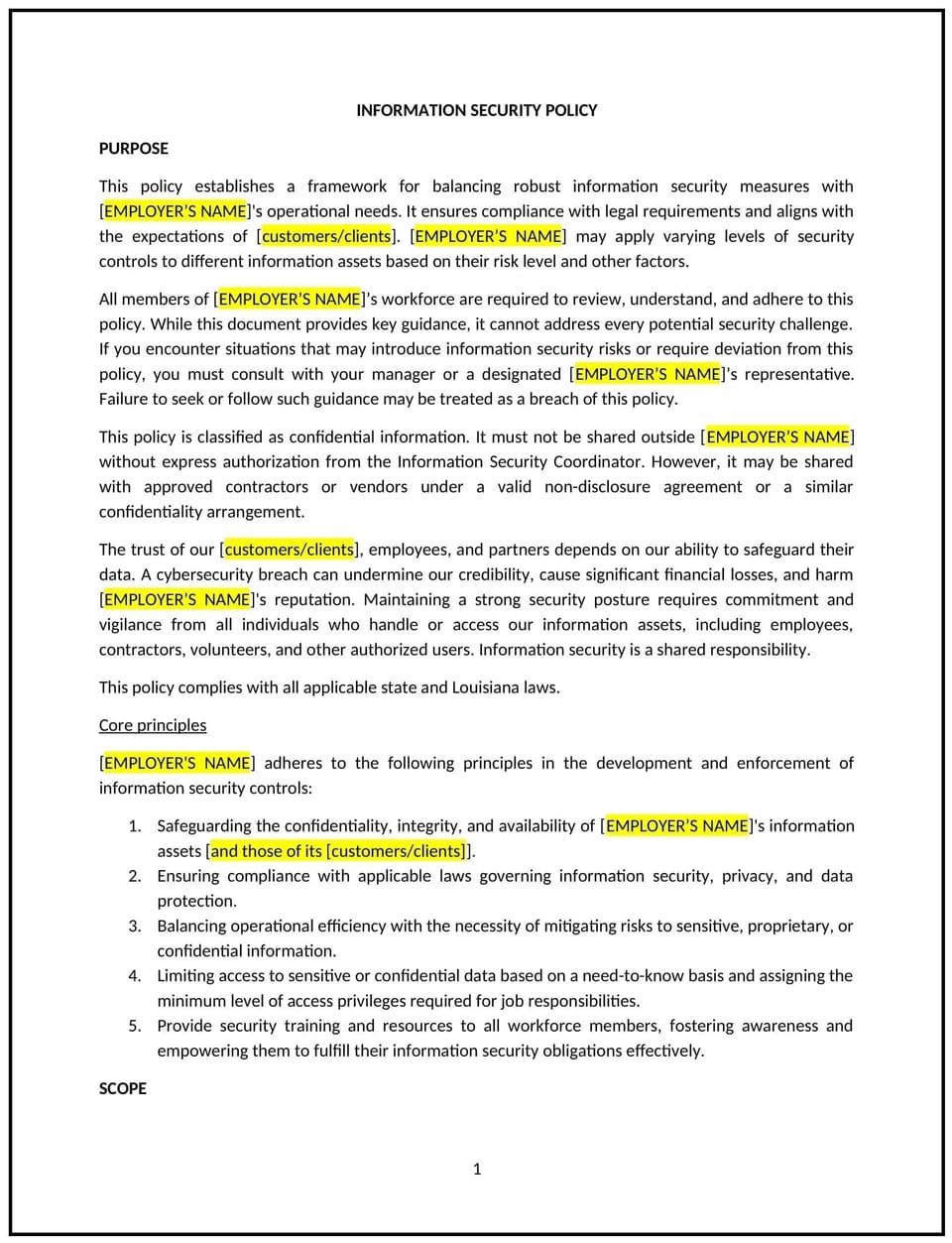Information security policy (Louisiana): Free template

Information security policy (Louisiana)
This information security policy is designed to help Louisiana businesses protect sensitive data and prevent unauthorized access to company information. It outlines responsibilities, security protocols, and procedures to safeguard digital and physical assets while promoting secure business practices.
By implementing this policy, businesses can reduce risks, protect valuable data, and maintain operational integrity.
How to use this information security policy (Louisiana)
- Define scope: Specify the types of information and systems covered by the policy, such as customer data, financial records, or IT systems.
- Outline access controls: Detail how access to sensitive information will be restricted based on employee roles and responsibilities.
- Establish data protection measures: Provide guidelines for encrypting, storing, and transmitting sensitive data securely.
- Include incident response procedures: Explain how to identify, report, and address security breaches or vulnerabilities.
- Address employee responsibilities: Clarify expectations for password management, device usage, and secure handling of information.
- Schedule regular audits: Specify procedures for reviewing and updating security practices to identify potential gaps.
Benefits of using an information security policy (Louisiana)
Implementing this policy provides several advantages for Louisiana businesses:
- Protects sensitive data: Safeguards proprietary and customer information from unauthorized access or breaches.
- Reduces operational risks: Mitigates potential disruptions caused by data breaches or cyberattacks.
- Clarifies responsibilities: Establishes clear expectations for employees handling sensitive information.
- Builds trust: Enhances confidence among customers, partners, and stakeholders.
- Reflects Louisiana-specific considerations: Adapts to regional business practices and security challenges.
Tips for using this information security policy (Louisiana)
- Educate employees: Provide regular training on recognizing phishing attempts, using strong passwords, and handling data securely.
- Use secure technologies: Implement firewalls, antivirus software, and encryption tools to protect systems and data.
- Conduct penetration testing: Regularly test systems for vulnerabilities and address identified risks.
- Monitor access: Use tools to track and manage access to sensitive data and systems.
- Update regularly: Revise the policy to address evolving security threats or technological changes.
Q: What types of data are covered under this policy?
A: The policy typically covers sensitive information such as customer data, financial records, intellectual property, and other proprietary business information.
Q: What are the key responsibilities of employees under this policy?
A: Employees are responsible for using secure passwords, avoiding phishing scams, reporting security incidents, and handling data securely.
Q: How should businesses respond to a data breach?
A: Businesses should follow incident response procedures, including isolating affected systems, notifying stakeholders, and addressing vulnerabilities.
Q: What tools can businesses use to enhance information security?
A: Businesses can use firewalls, encryption software, multi-factor authentication, and monitoring tools to improve data security.
Q: How can businesses ensure that sensitive data is transmitted securely?
A: Businesses should use encrypted communication channels, such as secure file transfer protocols or email encryption services.
Q: How often should this policy be reviewed?
A: The policy should be reviewed annually or when significant changes occur in technology, threats, or business operations.
Q: How can businesses train employees on information security?
A: Businesses can provide regular workshops, online training modules, or written materials to educate employees on security best practices.
This article contains general legal information and does not contain legal advice. Cobrief is not a law firm or a substitute for an attorney or law firm. The law is complex and changes often. For legal advice, please ask a lawyer.


